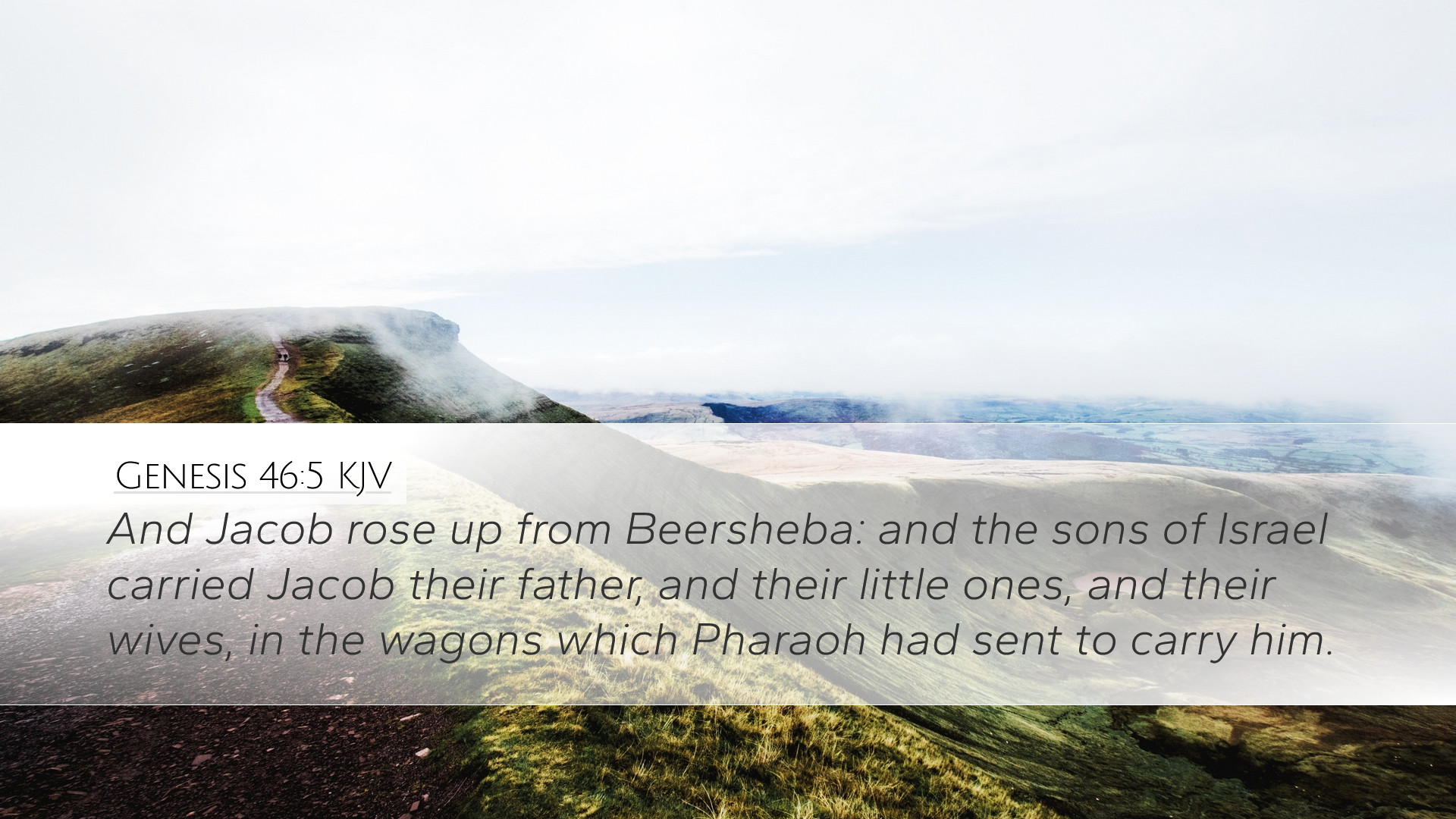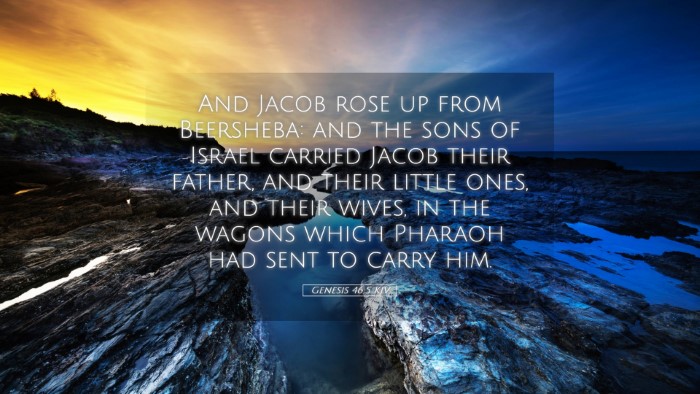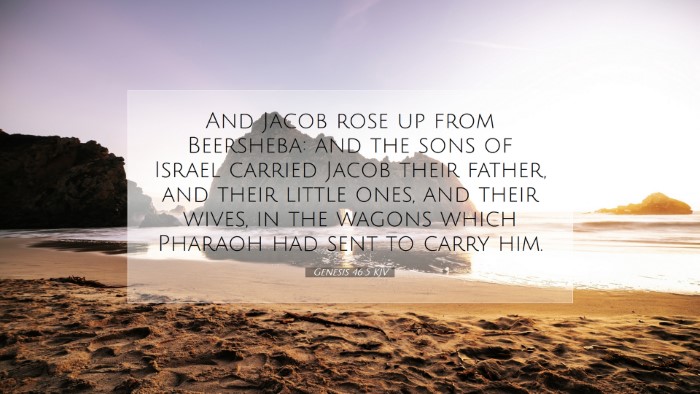Commentary on Genesis 46:5
Genesis 46:5 states, “Then Jacob rose up from Beersheba: and the sons of Israel carried Jacob their father, and their little ones, and their wives, in the wagons which Pharaoh had sent to carry him.” This verse marks a significant moment in Jacob's life as he prepares to move to Egypt, a transition filled with emotional gravity and theological implications.
Contextual Overview
Jacob, also known as Israel, is in a critical juncture of his life. The backdrop of this verse involves the famine in Canaan and the revelation that his son Joseph, whom he believed was dead, is alive and has risen to power in Egypt. This move not only signifies a physical journey but also reflects profound familial and spiritual dimensions.
The Significance of Beersheba
As Matthew Henry notes, Jacob’s departure from Beersheba is rich in significance. Beersheba, a place of covenant and divine encounters, represents a stage of transition. It is here that Jacob had previously established an altar (Genesis 21:31). Leaving this spiritually significant location illustrates the weight of his decision to go to Egypt, emphasizing the need for divine guidance as he leaves his homeland.
Divine Assurance
Albert Barnes emphasizes the importance of God’s assurance at this moment. Prior to Jacob's departure, God speaks to him in a vision (Genesis 46:3-4), assuring him that going to Egypt is part of His divine plan for Jacob's family. This divine approval is crucial, as it alleviates Jacob’s fears regarding this significant change. The assurance serves as a reminder that God is present in our transitions, urging us to trust Him amid uncertainties.
The Act of Moving
Adam Clarke observes that Jacob's act of rising up from Beersheba with his family is emblematic of faith in action. The text conveys a sense of urgency and determination; it reflects Jacob’s readiness to embrace God’s plan despite the unknowns ahead. Jacob’s decision to take his entire family signifies responsibility and care as a patriarch, emphasizing the importance of family unity in the pursuit of God's purposes.
The Role of the Sons of Israel
The mention of “the sons of Israel” carrying Jacob illustrates a communal aspect of this journey. As emphasized by Henry, this highlights a significant aspect of familial duty and support. The verb 'carried' suggests not only physical transportation but also emotional and spiritual support for Jacob in his old age.
- Family Dynamics: The involvement of Jacob's sons in this critical journey reinforces their loyalty and support. It may also reflect the restoration of familial bonds after their earlier treachery concerning Joseph.
- Leadership Transition: The act of carrying symbolizes not only care for the father but also an acknowledgment of the need for guidance and leadership as they enter a new land.
The Provision of Pharaoh
The wagons sent by Pharaoh are a sign of providence and favor, suggesting that God can use even secular authority to fulfill His plans. Barnes points out that these wagons symbolize not just physical means of transport, but also the support from a foreign power. This reflects the overarching theme that while Jacob's family is stepping into the unknown of Egypt, God has prepared a way for them.
Theological Implications
This passage serves as a profound theological reminder that God is sovereign over the affairs of men. Jacob’s transition to Egypt is more than a mere relocation; it is a movement within God's redemptive narrative that will eventually lead to the Israelites' growth and, ultimately, their deliverance from captivity.
- God's Sovereignty: The bigger picture involves God’s plan to establish a nation from Jacob’s lineage, a nation that will later experience bondage but also deliverance, giving rise to the theme of redemption throughout Scripture.
- The Presence of God: God's promise to Jacob that He will be with him in Egypt reminds believers of His continual presence through significant life transitions.
Application for Today
This verse challenges pastors, students, and theologians to reflect on their own life transitions and the ways God might be calling them to step out in faith, much like Jacob. The supportive role of family, the assurance of God’s presence, and the communal responsibility of bearing one another's burdens are significant lessons drawn from Jacob’s journey.
- Faith in Transition: Just as Jacob stepped into a new chapter under divine guidance, believers today are called to trust God when embarking on new journeys in life.
- Family as Support: The importance of family and community is highlighted, reminding Christians to foster supportive relationships that reflect God’s love.
Conclusion
Genesis 46:5 encapsulates a moment of deep significance that transcends the historical context of Jacob's journey to Egypt. It invites reflection on faith, family, divine providence, and God's sovereign plan. As believers consider Jacob's example, they are prompted to trust God amidst the uncertainties of their own journeys, leaning on the truth that He is present and working all things according to His purpose.


